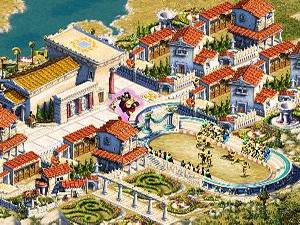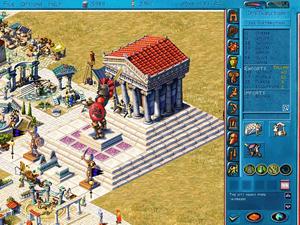Perhaps it’s wearing off.
I’ve been playing violent video games for most of my life. So according to a whole
slew of expensive quack psychologists, I should probably be constantly eager for
death and blood. Look out, I could snap at any minute. No, really. I swear.
But the other day I sat down at a computer in the vast Game Revolution Compound,
and had the sudden urge not to destroy (don’t worry, I’ll eventually
get over it). My eyes glazed over when I read the list of first-person shooters
available right on the desktop: Counterstrike,
Undying, Serious Sam…
but none of those were what I wanted. I yearned to build rather than to tear
down. I get like that sometimes.
So I went to the game shelves and found one that didn’t get so much free advertising
from the media, a city building game from Sierra called Zeus: Master of Olympus.
I figured not only would I get to create, but I could also write about the game
for all you other nice folks out there who didn’t snap into a violent rage today.
I hear that there are still one or two of you left.
And, Zeus, it turns out, is a pleasant surprise. It’s a laid-back,
cartoonish game with surprising depth. But the first surprise was that I didn’t
get to be Zeus.
The game is deveoped by Impressions, the ones responsible for other building-strategy
games like Caesar and Pharoah. It’s part Sim City, part
Civilization, and just a bit of capitalism thrown in for good measure.
Despite the fact that they look like little cartoons, those ancient Greeks were
pretty sharp. They invented democracy, doctors, wine, and fraternity houses.
So as the ruler of a ‘new’ ancient Greek city, you have your work cut out for
you.
Like the Sim City games you need to build roads, zone areas for housing
and maintain utilities and public buildings. And like Sim City, you have no
control over your little virtual city dwellers as they go about their daily
business. However, unlike those “Sims” each and every little Greek moving around
is actually doing something. Houses need water, but they don’t get it
unless the water delivery man actually goes there and delivers the water. First,
build enough fountains throughout your city and then, if you wanted to, you
could watch him make every delivery with a big jug of water.
This is only the first sign of the game’s complexity. Food, for example, is
even more complicated. Build a farm to produce wheat… easy enough. But to
get it into people’s mouths, the wheat must first be delivered to granaries
for distribution, then taken to the city agoras (markets), and finally brought
from the markets to people’s homes by the peddlers. And that’s just for food.
You’ll also need maintenance workers, healers, guards, philosophers, actors,
noblemen, vintners, olive-oil makers, stonecutters, artisans, armorers, tax
collectors, sailors, noblemen, horse breeders, traders, athletes and more. You
can raise and lower city taxes or wages , manage your unemployment rate, trade
with neighboring cities, or make war with them.
 However, all this
However, all this
is not quite as difficult as it sounds. You just have to build the buildings,
and those crafty little Greeks take care of everything else. Make sure your
city has a good balance of structures, and everything practically runs itself.
Of course, this is still a complicated game. Having to learn the uses of each
structure and figuring out how to ensure good resource flow is demanding. And
often, it’s more work than fun.
You’ll also need some heroes and the benevolent gaze of at least one of the
pantheon of Greek gods, just about all of whom make an appearance in Zeus.
Hercules and Jason, Aphrodite and Aries; they’re all there, and they all want
temples. Just don’t piss off the wrong gods, because unlike your contemporary
hands-off, holier-than-thou gods, the old Greek ones weren’t afraid of showing
up in person and kicking a little ass.
The first mission makes you the founder of ancient Thebes, a city which you
will continue to grow through the entire campaign. I liked this feature a lot
after playing too many strategy games where you have to start every new level
with just one peasant. You never lose all your hard work in Zeus, and
can grow your city to become the wonder of the Hellenic world. And Thebes is
only the first city of many to manage.
There’s even a smattering of real Greek mythology and history in there, but
it’s all mixed with made-up stuff, so don’t trust it for a test or an erudite
fact at a cocktail party. Speaking of learning, you won’t learn much from the
thick but fanciful manual. Figuring out the nitty gritty will be left mostly
up to you.
In the end, Zeus is a nice diversion and has enough missions to last
you until the next Bronze age. Plus you can always just build cities free-form.
But I found my trigger finger getting itchy at the end of the day. Zeus
is certainly engrossing, but it’s just not quite fun enough.
I’m sick of sacrificing chickens to Zeus. Now I want to be Zeus
and hurl some lightning around. Well, maybe not. As I recall, he had to eat
his father to get the job.

-
Cool little cartoon Greeks
-
Lots of depth
-
Hercules!
-
A little too convoluted
-
But no Xena, Warrior Princess











